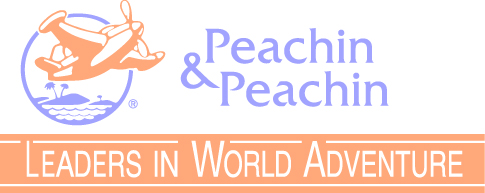Mary L. Peachin
Vol. 9 No. 7
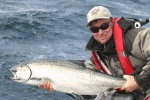 Eagles outnumber the Heerman’s gulls that are dive bombing schooling herring—frenzied into bait balls as they feast on plankton krill. Nearby, humpback whales breach and fin as if waving to salmon anglers who barely have time to notice. Someone radios that three black bears are grubbing for food in Bruin Bay. For the serious angler, the rugged three by two mile Haida Gwaii island of Langara is as close as it gets to a heavenly fishing kingdom in the Queen Charlotte Islands of northern British Columbia.
Eagles outnumber the Heerman’s gulls that are dive bombing schooling herring—frenzied into bait balls as they feast on plankton krill. Nearby, humpback whales breach and fin as if waving to salmon anglers who barely have time to notice. Someone radios that three black bears are grubbing for food in Bruin Bay. For the serious angler, the rugged three by two mile Haida Gwaii island of Langara is as close as it gets to a heavenly fishing kingdom in the Queen Charlotte Islands of northern British Columbia.
“You should have been here yesterday …when the fishing was really great.” Yeh, all anglers know that fishing story. But this one is different. Captain Mark McAneeley was guiding his salmon anglers when 40-some killer whales (orcas) surfaced. Suddenly the pod divided and 10 of these magnificent creatures surrounded Mark’s boat. Frolicking and blowing bubbles they circled the boat. The whales were intent on eating a hooked salmon, but they took their time do so. 10-minutes later, they suddenly grabbed the fish and sounded, leaving one amazed angler with a straightened hook.
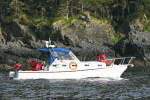 Thankfully these orcas were a migrating pod. When the voracious hunters pass through a fishery, they devour every fish in sight—both salmon and the bait that attracts them. Any fish that escape the whales head for the unknown. It may have been an awesome sight for yesterday’s angler, but it made for a slower day of fishing for the arriving 28 guests at Langara’s Island Lodge.
Thankfully these orcas were a migrating pod. When the voracious hunters pass through a fishery, they devour every fish in sight—both salmon and the bait that attracts them. Any fish that escape the whales head for the unknown. It may have been an awesome sight for yesterday’s angler, but it made for a slower day of fishing for the arriving 28 guests at Langara’s Island Lodge.
Perched 200-feet on top of a hillside surrounded by old growth forest, the cedar lodge, the smaller and most luxurious of Langara’s fishing lodges, overlooks Henslung Cove. An eight person ski-hill type tram carries guests from the dockside helipad to the entry of the lodge. Playful river otters swim beneath the dock as if welcoming newcomers.
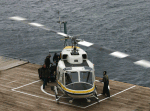 Not a moment is wasted. After a quick lunch, Langara’s 25-foot custom made Ironwood aluminum boats with two 90-hp 4-stroke engines speed anglers to the popular fishing grounds of Coho Point, about a 15-minute ride. The stable boats have high gunwales which provide leg leverage for fighting salmon. A compact, flushing head, so convenient for women, is located under the center console.
Not a moment is wasted. After a quick lunch, Langara’s 25-foot custom made Ironwood aluminum boats with two 90-hp 4-stroke engines speed anglers to the popular fishing grounds of Coho Point, about a 15-minute ride. The stable boats have high gunwales which provide leg leverage for fighting salmon. A compact, flushing head, so convenient for women, is located under the center console.
Several dozen boats mooch—trolling slowly with weighted lines using barbless hooks with cut-plugged herring bait—in the protected cove. High Northwesterly winds churning the surf don’t permit venturing further west along the rocky coastline.
Minutes after lowering the lines 17 pulls or about 35 feet, a small 20-ish pound Chinook–also called Spring–nibbles. Waiting patiently while feeling the bite, Mark watches the rod bend then says “hook it.” Twenty pounders are small because during the week five tyees—salmon weighing more than 30 pounds—were caught including a 52-pound release and a 65-pound trophy.
Wearing a toque over his fishing cap for warmth and surgical latex gloves to protect his hands from the salty brine of the herring bait, Mark is an experienced guide requested by anglers from all over the world.
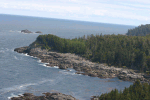 Unlike many other guides, the ones at Langara don’t hook biting fish for the guests. Hooking any fish is the challenge and fun part of the angling experience and, here, the novice has the opportunity to learn. Single action Islander reels—rather than level-wind—with light 20-pound test line adds more sport than the down rigging at deeper depths technique used by many fishing operations. Mooching requires more skill for the angler to hook the fish, and the guide has to determine the depth where the fish are feeding. If the angler doesn’t anticipate the run of the fish during the fight, the handles of the reel, well, that’s why they are called “knuckle-busters.”
Unlike many other guides, the ones at Langara don’t hook biting fish for the guests. Hooking any fish is the challenge and fun part of the angling experience and, here, the novice has the opportunity to learn. Single action Islander reels—rather than level-wind—with light 20-pound test line adds more sport than the down rigging at deeper depths technique used by many fishing operations. Mooching requires more skill for the angler to hook the fish, and the guide has to determine the depth where the fish are feeding. If the angler doesn’t anticipate the run of the fish during the fight, the handles of the reel, well, that’s why they are called “knuckle-busters.”
There wasn’t much time lapse between fish. When the fishing slacked off, we took time to admire bald eagles fishing. When herring splashed in the water like raindrops on a windshield, Mark caught them on bare hooks to use as tomorrow’s bait. “They have to be stiff with rigor mortis to spin through the water correctly.”
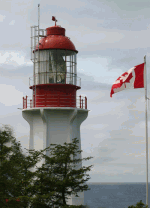 Yes, as Mark described it, we were fishing in the “last frontier.” These salmon grounds are as far north as you can fish in British Columbia. On a clear day you can see the southeast panhandle of Alaska, about 30-miles north. In Mark’s estimation, there isn’t a better place for salmon and halibut fishing.
Yes, as Mark described it, we were fishing in the “last frontier.” These salmon grounds are as far north as you can fish in British Columbia. On a clear day you can see the southeast panhandle of Alaska, about 30-miles north. In Mark’s estimation, there isn’t a better place for salmon and halibut fishing.
Before quitting time at 7:30 in the evening, we stopped on our return to the Lodge for a few minutes fishing in Bruin Cove. We were hoping to see a black or grizzly bear, coincidentally at a place where the sizable salmon hang out. Red-footed pigeoned guillemot swam by the boat, robin-like marbled murrelet dove quickly at the boat’s approach, while brown white-bellied rhinoceros auklet dived for herring.
Langara is not for “fair weather anglers or the faint of stomach.” Gale force wind—more than 30mph—can whip the ocean swell as high as 30 feet or more. Leaving the protection of Coho Point or McPherson to fish favorites like Andrews Point or the island’s west coast Lighthouse and No Name Point requires a calmer day.
Don’t tell that to Helen Hennekam, an octogenarian from Vancouver. The early part of the 5-day trip she landed the biggest Chinook of the week, a 36-1/2 pound tyee. Later in the week Peter Cliromos of Vancouver caught a 65-pound trophy fish and Paul Bauer of Long Island released a 52-pounder. While bottom fishing, Richard Bailey of Calgary landed a 92-pound halibut.
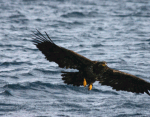 Awards saluting the cuisine of Michel Bertholet lined the walls near the small kitchen. The Chef takes pride in the presentation of his four course dinners. Manager Richard Taggert’s leadership shows in the customer service of his staff and fishing guides. They continually check to see each guest is happy.
Awards saluting the cuisine of Michel Bertholet lined the walls near the small kitchen. The Chef takes pride in the presentation of his four course dinners. Manager Richard Taggert’s leadership shows in the customer service of his staff and fishing guides. They continually check to see each guest is happy.
The island of Langara is uninhabited except for four fishing lodges and a remote lighthouse on the northwest side of the island. This beacon, built in 1907, is lit by a 500-watt bulb. The lighthouse, manned by a couple, is the first landfall seen by ships approaching North America. Rough water along this portion of the rugged coast frequently makes boat travel impossible. The red-topped lighthouse beacon is accessible by helicopter and our A-Star six passenger helicopter landed in the front yard.
Five of us were given a tour of the lighthouse which housed a tsunami reader. Following the tour, we were welcomed into the home where we were served spiced ice tea and blueberry cake. Before returning across the trail-less island, we landed briefly on the white sandy beach of Lepas Bay.
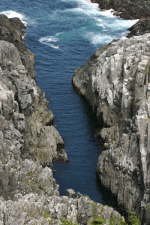 In Solide Passage, the passage along Lucy Island and route to more good fishing grounds, a young humpback played in 24 feet of water. The barometer was rising and so were the salmon. Now able to navigate through swells to reach Mc Pherson and Andrews Pts., we had access to different salmon fishing grounds. Another day when the wind shifted, we headed southeast passing Cox Island stopping to search for bright-beaked puffin nesting on cliffs. The island is unusual with its interesting rock formations and a hole in rock.
In Solide Passage, the passage along Lucy Island and route to more good fishing grounds, a young humpback played in 24 feet of water. The barometer was rising and so were the salmon. Now able to navigate through swells to reach Mc Pherson and Andrews Pts., we had access to different salmon fishing grounds. Another day when the wind shifted, we headed southeast passing Cox Island stopping to search for bright-beaked puffin nesting on cliffs. The island is unusual with its interesting rock formations and a hole in rock.
The changing winds also allowed us to fish southeast in the open ocean on the west coast near Lacy Island and the Lighthouse. We didn’t have time to watch the Heerman and Herring gulls and bald eagles feeding or another humpback finning and breaching. Our time was spent with 10 consecutive double hookups, we were continually fighting Chinook ranging from 20-30 pounds for three solid hours. Aching biceps cried for ibuprofen and a soak in one of the lodge’s two hot tubs. Stripping off the bright red survivor suits worn by all anglers, the warm water was perfect even in the rain. On the hillside, Sitka black tail deer nibbled the grass like lawnmowers.
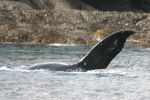 Twenty years ago, a Vancouverite school teacher Rick Bourne along with Richard, Robert, and John Noble had a dream. In 1984, they noted some great salmon fishing statistics from commercial operators around Langara. They brought in a floating barge which they converted to a lodge. 10 years later, they built the upscale (complete with Aveeda amenities in the bathrooms) 28-guest Island lodge. Little did Bourne know that his small 24-guest floating lodge would become one of the most popular salmon fishing lodges in North America. He soon expanded the Fishing lodge to hold 50 guests and added the 200-foot tram to carry guests to the Island lodge.
Twenty years ago, a Vancouverite school teacher Rick Bourne along with Richard, Robert, and John Noble had a dream. In 1984, they noted some great salmon fishing statistics from commercial operators around Langara. They brought in a floating barge which they converted to a lodge. 10 years later, they built the upscale (complete with Aveeda amenities in the bathrooms) 28-guest Island lodge. Little did Bourne know that his small 24-guest floating lodge would become one of the most popular salmon fishing lodges in North America. He soon expanded the Fishing lodge to hold 50 guests and added the 200-foot tram to carry guests to the Island lodge.
Today, despite some rough weather and seas, four or five day trips allow as much fishing as the guest can handle. And while the fishermen play, the staff at the lodge busily rescues a newborn sea lion, its umbilical cord still attached. It’s just another day in the Queen Charlottes, one of salmon fishing’s “last frontiers.”
If you go:
Getting to Langara is a great part of the adventure. A 50-seat Convair 580 turbo–prop flies from the gateway city of Vancouver, British Columbia two hours north to the Haida Gwaii village of Massett. Transferring to a 14-passenger Bell helicopter the 20-minute trip across Graham Island provides a bird’s eye view of desolate forest with the sighting of an occasional black bear, log-strewn beaches, frothy white capped seas, and rugged volcanic pinnacles. An overnight stay in Vancouver is recommended on arrival and departure days.
Vancouver is the gateway to the Queen Charlotte Islands: If you go:
Langara Fishing Lodge 800-942-2121 e-mail info@langara.com www.langara.com
Sportfishing Institute of British Columbia (604) 689-3438 or e-mail sfiofbc@intergate.bc.ca or go to www.sportfishing.bc.ca
Vancouver is the gateway to BC fishing:
Vancouver International Airport is served by most carries including America West, Alaska, United, British Airways, Air Canada and others. BC Ferries operates from Seattle. (1-888-BCFERRY)
For complete city guide: go to http://www.tourismvancouver.com (one of the best city sites on the web)
Airport Hotels:
Fairmont Vancouver Airport (in the international terminal) (604) 207-5200 e-mail vancouverairport@fairmont.com or go to www.fairmont.com
Delta Vancouver Airport Hotel (800) 268-1134 or e-mail deltanet@deltahotels.com or go to www.deltahotels.com
City Hotels: Fairmont Hotel Vancouver e-mail hvcreservations@fairmont.com or go to www.hotelvancouver.com Wedgewood Hotel 1-800-663-0666 e-mail info@wedgewoodhotel.com or go to www.wedgewoodhotel.com Marriott Pinnacle or go to www.mariott.com Sutton Place Hotel e-mail info@vcr.suttonplace.com
Robson Street Restaurants: CinCin Restaurant & Bar: go to www.cin-cin.com and Zin (Pacific Palisades Hotel) go to www.zin-restaurant.com Dim Sum: Chinese Imperial Seafood: go to www.imperialrestaurant.com Rodney’s Oyster House 1228 Hamilton (604) 689-8023
